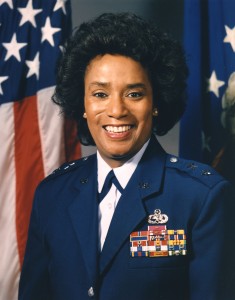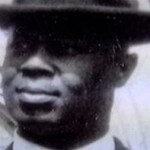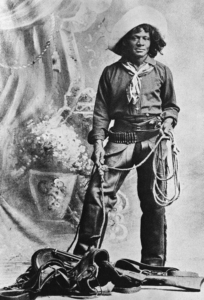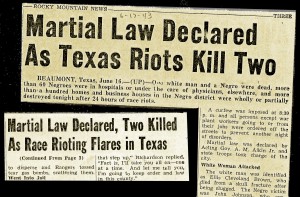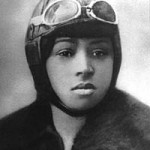Elizabeth Taylor Greenfield, “The Black Swan”
Born into slavery, Elizabeth Taylor Greenfield broke barriers with every note she sang
(JSTOR Daily) Her voice swooped and soared through complex operatic melodies, thrilling audiences in the antebellum North. She gave encore after encore to listeners who couldn’t get enough. She was Elizabeth Taylor Greenfield, one of the first Black performers to gain nationwide fame in the nineteenth-century United States. Musicologist Julia J. Chybowski digs into the history of “The Black Swan”—and explores how her identity was interpreted by audiences.
Greenfield was born into slavery in 1819, and named after her mistress, a Quaker woman. Greenfield moved from the South to Philadelphia after the woman who had enslaved her freed all of her slaves. She continued to work as her former mistress’s caretaker for years, even as she received a formal education and learned to sing. “Despite having been born into slavery, E. T. Greenfield shared much cultural background with European Americans and free-born African Americans living in Philadelphia,” Chybowski writes. (more)
2019 Aya Symposium at PVAMU
“Education: THE Foundation for Civil Rights in Texas Freedom Colonies”
The Aya Symposium, in association with the Texas Purple Hull Pea Festival, will be held on Wednesday, June 19 (“Juneteenth”), 2019 at Prairie View A&M University in the School of Architecture. Texas educators, historians, and history enthusiasts are encouraged to attend. K-12 Texas educators will receive 7 CPE credits.
The one-day symposium will begin at 9 a.m. and include workshops, panels, and guest speakers. Keynote speaker for the event will be Dr. Peniel E. Joseph, Founding Director, Center for Race & Democracy, University of Texas at Austin. Other noted speakers will be Dr. Melanye Price, who will head PVAMU’s new African American Studies program, and Dr. Andrea Roberts, Assoc. Dir., Center for Housing & Urban Development at Texas A&M University and founder of the Texas Freedom Colonies Project.
On June 19, 1865, more than two years after the Emancipation Proclamation, Texas’ enslaved residents were informed of their freedom. Almost immediately, these newly emancipated Texans began to assert themselves as resourceful, innovative citizens, forming more than 540 “Freedom Colonies” throughout the state during the mid-19th through the early 20th centuries as foundations in the fight for Civil Rights for Texans of African descent.
The goal of this symposium, entitled “Education – THE Foundation for Civil Rights in Texas Freedom Colonies” will be to explore the history of the educational systems and structures in Freedom Colonies, their influence on fostering and sustaining Black civil rights in the late 19th and early 20th centuries, and their impact on African-American Texans today.
For registration and more information, visit the Aya web site, www.ayasymposium.org/.
Effort afoot to start endowment for Dallas’ African American Museum — and honor its longtime director
(Dallas News) Grassroots plans are germinating to help secure the financial future of Dallas’ African American Museum through an endowment. But organizers are proceeding cautiously to test if their home-grown proposal will work within the targeted five years.
Organizers are stirring up public enthusiasm for the idea, which they say has been raised before but deserves a revival.
Dr. LaTrese Adkins Weathersby is a Dallas native, historian and educator who lectured during this year’s Women’s History Month at the museum at Fair Park. Weathersby founded and leads The Beloved Community Consulting Group, a South Dallas advocacy group that has worked on local arts and history projects.
Weathersby said that while researching the museum and its supporters for her lecture, she learned that talks about developing a long-term sustaining program for the museum have occurred off and on for years. She said she was impressed by the infectious passion and dedication of Dr. Harry Robinson Jr., the museum’s 77-year-old founding director, president and CEO. So she is volunteering to assemble people — hopefully, a new generation of museum advocates — to help museum officials move the endowment effort forward. (more)
First Black Woman to Serve as Major General Laid to Rest at Arlington National Cemetery
Major General Marcelite Jordan Harris, the first Black woman to serve as a major general in the U.S. military, was laid to rest with full military honors in Arlington National Cemetery on Feb. 7, alongside her husband, Lt. Col. Maurice Harris, USAF (Ret.).
Harris died unexpectedly on Sept. 7, 2018, at age 75. She served more than 30 years in the U.S. Air Force in a variety of capacities.
Born Jan. 16, 1943 in Houston, Harris graduated from Kashmere High School before enrolling at Spelman College, where she earned a bachelor’s degree in 1964. She was a member of Delta Sigma Theta Sorority, Inc.
Harris also received an honorary doctorate of letters from Spelman and earned a B.S. in Business Management at the University of Maryland University College. (more)
TIPHC Bookshelf
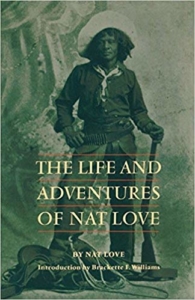 Published scholarship on black history in Texas is growing and we’d like to share with you some suggested readings, both current and past, from some of the preeminent history scholars in Texas and beyond. We invite you to take a look at our bookshelf page – including a featured selection – and check back as the list grows. A different selection will be featured each week. We welcome suggestions and reviews. This week, we offer, “The Life and Adventures of Nat Love,” by Nat Love.
Published scholarship on black history in Texas is growing and we’d like to share with you some suggested readings, both current and past, from some of the preeminent history scholars in Texas and beyond. We invite you to take a look at our bookshelf page – including a featured selection – and check back as the list grows. A different selection will be featured each week. We welcome suggestions and reviews. This week, we offer, “The Life and Adventures of Nat Love,” by Nat Love.
Thousands of black cowpunchers drove cattle up the Chisholm Trail after the Civil War, but only Nat Love wrote about his experiences. Born to slaves in Davidson County, Tennessee, the newly freed Love struck out for Kansas after the war. He was fifteen and already endowed with a reckless and romantic readiness. In wide-open Dodge City, he joined up with an outfit from the Texas Panhandle to begin a career riding the range and fighting Indians, outlaws, and the elements. Years later he would say, “I had an unusually adventurous life.”
That was a rare understatement. More characteristic was Love’s claim: “I carry the marks of fourteen bullet wounds on different parts of my body, most any one of which would be sufficient to kill an ordinary man, but I am not even crippled.” In 1876 a virtuoso rodeo performance in Deadwood, Dakota Territory, won him the moniker of “Deadwood Dick.” He became known as DD all over the West, entering into dime novels as a mysteriously dark and heroic presence. This vivid autobiography includes encounters with Bat Masterson and Billy the Kid, a soon-after view of the Custer battlefield, and a successful courtship. Love left the range in 1890, the year of the official closing of the frontier. Then, as a Pullman train conductor, he traveled his old trails, and those good times bring his story to a satisfying end.
This Week in Texas Black History
Jun 9
 On this date in 1965 the University Interscholastic League State Executive Committee validated the Legislative Council’s decision to open league membership to all public schools. The UIL was formed in 1913 with the stipulation that its membership was open only to white schools. In 1920, the Prairie View Interscholastic League was formed as the UIL’s counterpart to govern academic and athletic competitions for the state’s high schools for black students. Black schools began UIL competition in the 1967-68 school year. After the 1969-70 school year, the UIL fully absorbed all PVIL member schools. The PVIL played a leading role in developing African-American students in the arts, literature, athletics and music from the 1920’s through 1970. Among its football stars, alone, were: Bubba Smith(Beaumont Charlton-Pollard), “Mean” Joe Greene (Temple Dunbar), Otis Taylor (Houston Worthing), Ernie Ladd (Orange Wallace), and Jerry Levias (Beaumont Hebert).
On this date in 1965 the University Interscholastic League State Executive Committee validated the Legislative Council’s decision to open league membership to all public schools. The UIL was formed in 1913 with the stipulation that its membership was open only to white schools. In 1920, the Prairie View Interscholastic League was formed as the UIL’s counterpart to govern academic and athletic competitions for the state’s high schools for black students. Black schools began UIL competition in the 1967-68 school year. After the 1969-70 school year, the UIL fully absorbed all PVIL member schools. The PVIL played a leading role in developing African-American students in the arts, literature, athletics and music from the 1920’s through 1970. Among its football stars, alone, were: Bubba Smith(Beaumont Charlton-Pollard), “Mean” Joe Greene (Temple Dunbar), Otis Taylor (Houston Worthing), Ernie Ladd (Orange Wallace), and Jerry Levias (Beaumont Hebert).
Jun 11
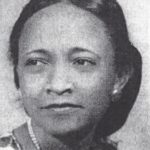 On this day in 1991, Connie Yerwood died in Austin. In 1937, she became the first African American doctor to work for Texas Public Health Services. The Victoria native would also become the first black director of Maternal and Child Services in Texas and the first black chief of the Bureau of Personal Health Services. Yerwood was a long-time trustee of Samuel Huston College and the national president of its National Alumni Association.
On this day in 1991, Connie Yerwood died in Austin. In 1937, she became the first African American doctor to work for Texas Public Health Services. The Victoria native would also become the first black director of Maternal and Child Services in Texas and the first black chief of the Bureau of Personal Health Services. Yerwood was a long-time trustee of Samuel Huston College and the national president of its National Alumni Association.
Jun 12
James Leonard Farmer, Sr., who normally wrote his name “J. Leonard Farmer” on all of his publications, was born on this date in Kingstree, South Carolina in 1886. Farmer became Texas’ first black professor with an earned Ph.D (Boston University 1918), pastored churches in Texarkana, Marshall and Galveston and taught at Wiley College in Marshall (1919-20 and 1934-39) and Samuel Huston (later Huston-Tillotson) (1925-30 and 1946-56), in Austin. His son, James Farmer, Jr., was a noted Civil Rights activist and founder of CORE and was one of Wiley’s “Great Debators.”
Jun 14
In 1854, on this date, famous cowboy Nat Love, “Deadwood Dick,” was born as a slave on Robert Love’s plantation in Davidson County Tennessee. (Nat is pronounced “Nate.”) Love became proficient at breaking horses, and at age 15, headed west with $50 in his pocket to seek work as a cowboy. In Dodge City, Kansas, he met the crew of the Duval Ranch at the conclusion of their cattle drive and returned with them to Texas to work at the ranch. The teenager quickly adapted to cowboy life and excelled as a ranch hand and a marksman with his .45 revolver. He earned the name, “Deadwood Dick,” after winning an all-around cowboy contest in Deadwood, S.D. The contestants competed in roping, bridling, saddling, and shooting and Love finished first in each category, walking away with the $200 prize and a new nickname.
Jun 15-16
On these days in 1943, the Beaumont Riots occurred. Conditions in the city were already tense because blacks and whites were competing for jobs in the shipyards because of World War II and because of a lack of enough resources, traditionally segregated facilities were forced to integrate. The situation escalated when a white woman reported being raped by a black man, though she was unable to identify the suspect being held at the city jail. However, on the evening of June 15 more than 2,000 workers, plus perhaps another 1,000 interested bystanders, marched toward City Hall, then dispersed into small bands and began breaking into stores in the black section of downtown Beaumont. With guns, axes, and hammers, they proceeded to terrorize black neighborhoods in central and north Beaumont. Many blacks were assaulted, several restaurants and stores were pillaged, a number of buildings were burned, and more than 100 homes were ransacked. More than 200 people were arrested, fifty were injured, and two – one black and one white – were killed. Another black man died several months later of injuries received during the riot. Beaumont was among several U.S. cities that experienced violent race riots that summer, including Detroit, Harlem, and Mobile, Ala.
Jun 15
On this date in 1921, Bessie Coleman, from Atlanta, Texas, became the first licensed black pilot in the world when she earned an international aviation license from the Federation Aeronautique Internationale. As a barnstorming stunt pilot, she became known as “Queen Bess” and “Brave Bessie.” In 1995, the U.S. Postal Service issued a stamp in Bessie’s honor and in 2000 she was inducted into the Texas Aviation Hall of Fame. The main road to Atlanta’s airport is named Bessie Coleman Drive.
Blog: Ron Goodwin, Ph.D., author, PVAMU history professor
Ron Goodwin is an assistant professor of history at Prairie View A&M University. Even though he was a military “brat,” he still considers San Antonio home. Like his father and brother, Ron joined the U.S. Air Force and while enlisted received his undergraduate degree from Texas Lutheran University in Seguin, Texas. After his honorable discharge, he completed graduate degrees from Texas Southern University. Goodwin’s book, Blacks in Houston, is a pictorial history of Houston’s black community. His most recent book, Remembering the Days of Sorrow, examines the institution of slavery in Texas from the perspective of the New Deal’s Slave Narratives.
Recent Posts
The Everlasting Light
Ye are the light of the world. A city that is set on an hill cannot be hid. Neither do men light a candle, and put it under a bushel, but on a candlestick; and it givith light unto all that are in the house. Let your light so shine before men, that they may see your good works, and glorify your Father which is in heaven. — Matthew 5: 14-16
This is the month set aside to honor…(more)
The Return of the Silent Majority
Fifty years ago, in January 1969, Richard Nixon was sworn in as the thirty-seventh president of the United States. His legacy as President was marred by the Watergate investigations and his eventual resignation from office which overshadowed the way in which he won the office. His central campaign rhetoric was designed to garner support from white Southerners (otherwise known in history as the “Silent Majority”) whose racial beliefs leaned heavily towards the support of white…(more)
Submissions wanted
Historians, scholars, students, lend us your…writings. Help us produce the most comprehensive documentation ever undertaken for the African American experience in Texas. We encourage you to contribute items about people, places, events, issues, politics/legislation, sports, entertainment, religion, etc., as general entries or essays. Our documentation is wide-ranging and diverse, and you may research and write about the subject of your interest or, to start, please consult our list of suggested biographical entries and see submission guidelines. However, all topics must be approved by TIPHC editors before beginning your research/writing.
We welcome your questions or comments. Please contact Michael Hurd, Director of TIPHC, at mdhurd@pvamu.edu.



